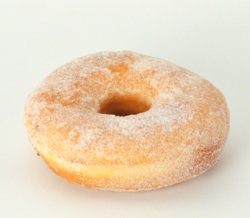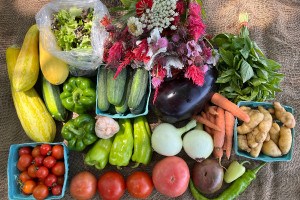First-Time Finisher: Does a Runner’s Diet Matter?
Be Well Philly’s Q&A with running superstar (and Philly native) Phil Clark left me with an uneasy feeling in my gut.
Or wait—that might just be gnawing hunger.
“When you called, I was just finishing a lunch that will probably be my biggest meal of the day: a salad of spinach, carrots and tomatoes with pumpernickel bread and quinoa,” he said, cavalier, in the interview. “It’s about eating less of everything, no matter what it is. Every pound of you that there is not, is three pounds of pounding you don’t have to endure. So as a runner, it’s in your best interest to be lean.”
So … it’s not in my best interest, then, to keep my peanut butter intake at a steady 1.5 jars per week? Not a good idea, in fact, to inhale bags of Trader Joe’s trail mix like an industrial-strength Air Vac? Not necessary to report to coworkers that while the raspberry tart and cherry pie on the conference room table are a bit dry, the cupcakes and Krispy Kremes are as decadent as ever?
Is it just me, or did running just get way less fun?
But Clark isn’t the first runner I’ve heard of to be a pasta party pooper. A friend who once hosted a couple of Kenyan runners for a big road race in Maine told me that all they wanted to chow down on before churning out a handful of sub-5 minute miles was a small bowl of cornmeal. And a banana.
It might be an American mentality, but I think that runners, in general, have a complicated relationship with food. As Clark implies, many people think running is a free pass to become a human garbage disposal. On the other hand, for reasons he so brutally makes clear, an unsettling number of runners fixate on having a waifish physique. And the media doesn’t short us on ways to obsess—we’re bombarded with articles on protein-to-carb ratios, ads for electrolyte waters, and recipes for performance-enhancing conctions like an avocado-citrus-almond butter smoothie. The perfect diet is a constantly moving target.
On the outside, it seems like eating shouldn’t be such an involved process for people who torch calories on a daily basis. Eat as much as you need, and stop there. Lay off the office pastries. Is it really so hard?
But when a rail-thin running champion is telling me to eat carrots and quinoa (and less of them, at that) while boxes of scrumptious donuts are popping up around the office, it’s all too easy to fall into worry and guilt.
My attitudes toward nutrition and eating are basically the same attitudes I take toward training. I’m disciplined about getting up and running most of the time. When I don’t, antsiness (and maybe a little guilt) get me back on track. It’s the same thing with food: When I don’t eat well for a couple days, physical unease (and maybe a little guilt) throw me into salad mode again.
There’s not really a way to escape the constant message that runners can get faster with with some ultra-balanced, omega-3-rich meal plan that’s heavy on raw kale and sardines. I take note of nutritional tips every now and then, but I think ultimately the most sustainable diet is one driven by common sense and cravings, not carb ratios.
Besides, despite what Phil Clark says, I can’t help but insist that one of the best parts of being a runner is being the first one to try the office cupcakes.
Research editor Annie Monjar blogs about her training for the Philadelphia Marathon each week here on Be Well Philly. Want to catch up on the series? Here are her earlier posts, starting from the beginning:
• Taking the Marathon Dive
• Running a Marathon is @#^%*! Expensive
• The Great iPod Debate
• Knowing When to Take a Day Off
• A Good Trail Is Hard to Find
• Is Yoga Worth It for Runners?
• Group Runs Are for Angry Birds



